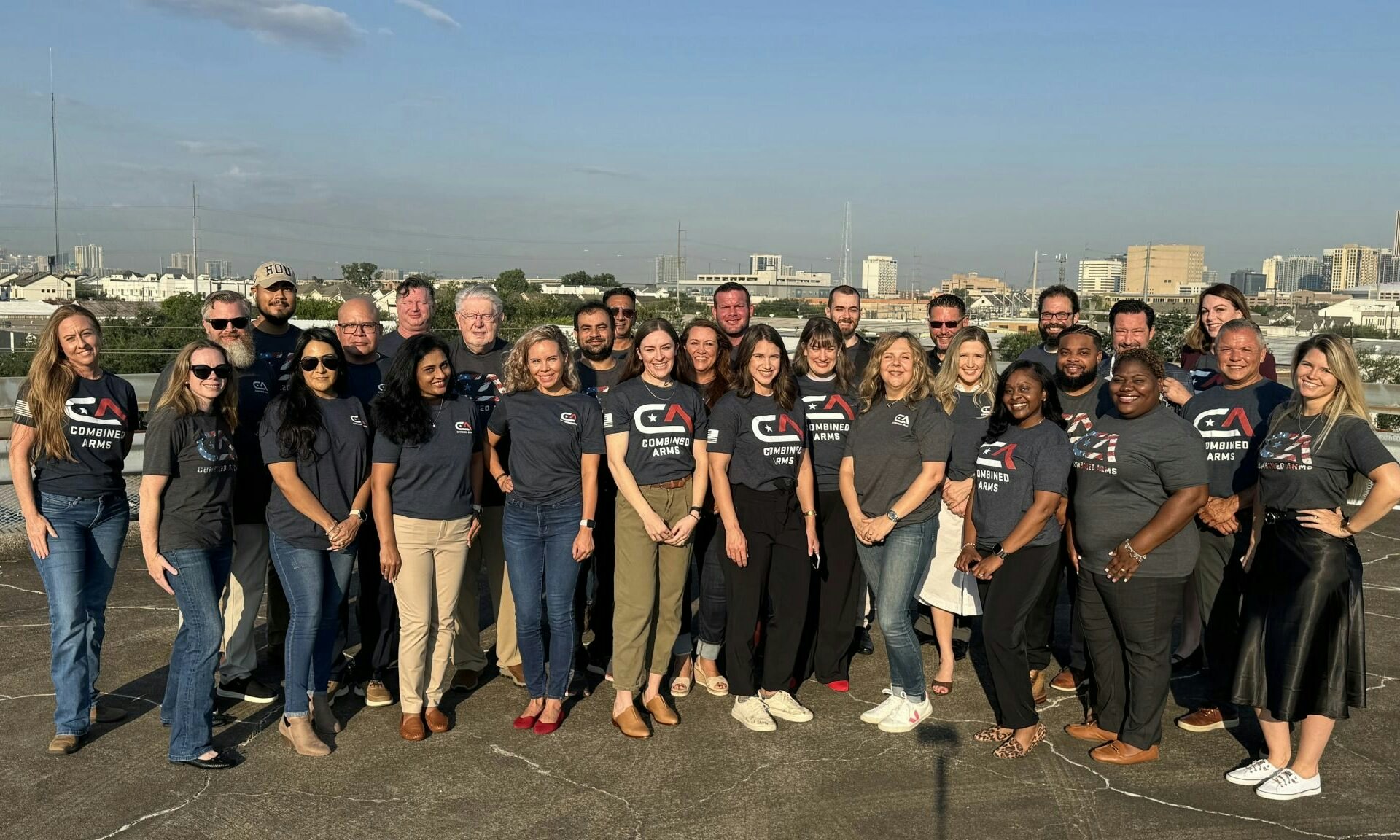Olivia Valerio, 2023 Stand-To Veteran Leadership Program Scholar and HR Strategic Project Manager of the Military Bridges Program at H-E-B, discusses her passion for supporting veterans and lessons she learned in the Veteran Leadership Program.
Please tell us a little bit about yourself and your personal leadership project.
Military affiliation has always been a natural part of my life. I was born and raised in El Paso, Texas, the daughter of a U.S. Army veteran.
Military service permeated through multiple generations of my family. Some of my fondest childhood memories include attending the annual Fort Bliss Armed Forces Day parade or hearing my grandmother receive Red Cross calls during her weekend shifts, not realizing the magnitude of her work. My mother was a nurse and educator and my uncle a Navy veteran and retired fire chief.
I was always aware of those that exemplified an ongoing duty to assist and contribute to our community, although it would be years before I recognized my own passion and inclination to serve others. It wouldn’t be until decades later, as an Air Force spouse, that an unexpected job opportunity would result in a career that provided me with the chance to combine my intrinsic desire to care for and assist others with my drive to create a positive and sustainable impact.
Like many military spouses, I experienced employment challenges related to my spouse’s military service. It was during our time on the tiny island of Okinawa, Japan, that I took the role I often credit as the catalyst for my work with military families: I began working with transitioning service members and their families as a Personal & Professional Developmental Advisor with Marine Corps Community Services.
The desire to make a lasting impact and serve military families sharpened as we arrived at our final active-duty assignment in San Antonio, Texas. Once again, I found myself struggling to find employment through our first year at our new location, as I managed a household, employment, education, and family all while remaining supportive and present for my service member.
I became a government contractor supporting individuals navigating the Medical Evaluation Board process after attending a military spouse workshop and actively applying the resources provided. I was then able to move into a role in which I managed a national SkillBridge program, working with transitioning service members to obtain internship and employment opportunities with national and global organizations. This both challenged me and allowed me to see the positive impact we had on people’s lives.
So it was only natural that my personal leadership project focused on service with the goal of creating an organizational impact. Shortly before applying for the 2023 Stand-To Veteran Leadership Program, I was approached with an opportunity to build a military-focused employment program at H-E-B which emphasized serving military families – including the often overlooked, working age dependents. I accepted and began working as H-E-B’s Military Bridges Project Manager. This served as the foundation for my personal leadership project.
Please give us an update on what you have been working on since completing the Stand-To Veteran Leadership Program.
In the year since completing the Veteran Leadership Program, I have applied so many of the lessons we received during our sessions. With guidance from mentors and my professional network, I have been able to align objective strategies, company values, and my own personal and genuine interest to curate a service centered, military talent program. Most recently we have completed a memorandum of understanding with Joint Base San Antonio, fortifying efforts between the Department of Defense’s largest joint base and an organization with a footprint and heart as big as Texas.
Which lessons learned during the Veteran Leadership Program have stayed with you the most, and how have you put those lessons into action?
One of the first things I learned that really resonated with me was to work on things I can change. This was a bit of a revelation for me. I had spent years guiding transitioning members through their process and teaching them the value and importance of transitioning not only from service to civilian sector, but from subject matter expert to new learner within an organization. I now needed to heed my own advice.
What are some of the biggest opportunities you have identified as you began your role as H-E-B Military Bridges Project Manager, and what are you most looking forward to?
By far the greatest opportunity I have had thus far has been getting to know my fellow H-E-B Partners. I cannot say how astounded I am by the investment of this amazing group of people. An additional highlight has been working with our Partner Resource Group, composed of veterans, military spouses, and allies. It provides an outpouring of support for the Military Bridges program and members are often sources of inspiration, sharing their own experiences and lessons learned.
Next on the list is bringing the Defense Department’s SkillBridge program and military spouse internships into H-E-B. This has truly been a collaborative effort, as I have been able to work with numerous teams across operations. The feedback on SkillBridge integration has been motivating, and we are now nearing the execution phase. I am particularly proud of this and can attest to the many successes of SkillBridge and military spouse internship participants. I am looking forward to providing a space for military talent to demonstrate their strengths across business lines.
Can you discuss the importance of supporting veterans and their family members in their workforce development journey? What are some of the unique challenges they face?
Speaking from the perspective of a military spouse who has greatly benefited from the support of others during my own professional journey, it’s critical. It’s only because I received the support to step forward and step up that I have been able to make strides in my own professional journey.
I would not be having this conversation with you today had I not received the support of my spouse to manage child care as I attended employment workshops and interviews – or the support of my past and present leadership that either understood the challenges from their own lived experiences or were compelled to learn and provide support.
With a national unemployment average that consistently hovers above 20%, military spouse unemployment and underemployment remains a critical issue. It’s often difficult to establish a career, particularly in a specialized field, or complete continuing education because of the many life events that a military spouse endures and the support their spouse’s military service requires.
I am surrounded by a wonderfully supportive organization, and we are working to provide greater education on this topic, which will address employment gaps and further destigmatize antiquated notions through broader conversations.




























